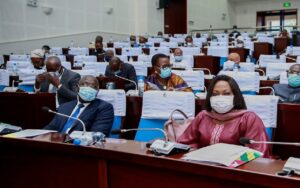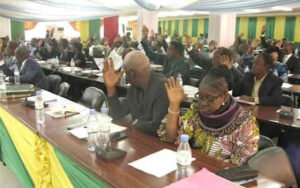On June 29, 2021, the National Assembly of Togo made significant strides by passing two pivotal bills during the 12th plenary session of its first ordinary session of the year. These legislative moves represent important developments in cybersecurity and human rights, reflecting Togo’s commitment to modernizing its legal and institutional frameworks.
Ratification of the Malabo Convention
A major highlight of the session was the adoption of a bill authorizing Togo to ratify the Malabo Convention on cybersecurity and the protection of personal data. The Malabo Convention, officially known as the African Union Convention on Cyber Security and Personal Data Protection, aims to:
- Enhance Digital Security: Establish comprehensive guidelines for securing electronic transactions.
- Protect Personal Data: Ensure robust safeguards for the privacy of personal information.
- Combat Cybercrime: Provide a framework for regional cooperation to tackle cyber threats.
General Yark Damehame, Minister of Security and Civil Protection, stressed that the ratification would strengthen Togo’s digital infrastructure and align it with regional standards, promoting a safer digital environment across the continent. Mrs. Yawa Djigbodi Tsègan, President of the National Assembly, highlighted the broader benefits, including improved legal protections and enhanced regional cooperation.
Revised Organic Law for the National Human Rights Commission
The second bill introduces amendments to Organic Law No. 2018-006, which governs the National Human Rights Commission (CNDH). The updated law aims to improve the commission’s effectiveness and independence. Key changes include:
- Extended Term of Office: CNDH members’ terms are now three years, with one renewal option, compared to the previous two-year term with three possible renewals.
- Longer Renewal Deadline: The deadline for renewing CNDH members has been extended from one month to three months before the term ends.
- Enhanced Independence: The new provisions enshrine the commission’s plenary assembly, criminal immunity for members, and the ability to handle individual and collective human rights petitions.
Christian Trimua, Minister of Human Rights, Citizenship Training, and Relations with the Institutions of the Republic, emphasized that these amendments are designed to bolster the CNDH’s role in protecting and promoting human rights, while also reinforcing its operational independence.
Session Overview and Future Outlook
The first ordinary session of 2021, which has now concluded, lasted four months and resulted in the adoption of fifteen bills from a total of twenty-two submitted. This productive session reflects the National Assembly’s dedication to advancing legislative reforms and addressing key national issues.
These recent legislative developments in cybersecurity and human rights mark significant milestones in Togo’s efforts to align with international standards and improve its institutional frameworks. The National Assembly’s work in these areas will be crucial for shaping Togo’s future in the digital age and reinforcing its commitment to human rights and effective governance.


